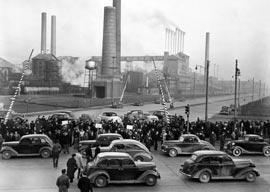
August 25, 2015

Ford Motor Company, 1941
Source: Shutterstock
“What’s in it for us?” he seems ever to be asking.
He has called Vladimir Putin a Russian patriot and nationalist with whom he can talk. He has not joined the Republican herd that says it will cancel the Iran nuclear deal the day they take office, re-impose U.S. sanctions and renegotiate the deal.
Trump says he would insure that Iran lives up to the terms.
While his foreign policy positions seem unformed, his natural reflex appears nonideological and almost wholly results-oriented. He looks on foreign trade much as did 19th-century Republicans.
They saw America as the emerging world power and Britain as the nation to beat, as China sees us today. Those Americans used tariffs, both to force foreigners to pay to build our country, and to keep British imports at a price disadvantage in the USA.
Then they exploited British free trade policy to ship as much as they could to the British Isles to take down their factories and capture their jobs for U.S. workers, as the Chinese do to us today.
Whatever becomes of Trump the candidate, Trumpism, i.e., economic and foreign policy nationalism, appears ascendant.